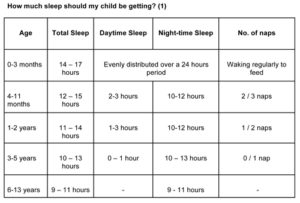
by Katie Venn
Precious Little Bunnies
This article, ‘What to expect from your new baby’s sleep’, is the first in a series of three articles on children’s sleep. This will be followed by ‘Nailing the perfect bedtime routine’ and ‘Sleep myths busted’. Before we get into baby’s sleep, did you know that foetus’ start sleeping from 23 weeks? In fact they spend most of their time before birth asleep. Mothers can even affect how the foetus is sleeping. Most women avoid alcohol in the first trimester, as it is widely known to impact development, what is lesser known is that alcohol in the final trimester and particularly the last few weeks before birth can reduce the foetus’ ability to REM sleep (which is the type of sleep needed for development).
Birth – 10 weeks
In the early days sleep is driven by the feeding. Babies will wake to be fed and often fall asleep whilst being fed. If your baby is waking up a lot, he/she is probably hungry or needs a nappy change, rather than having a sleep issue. Whilst all babies are different, there are a few things you might expect in this period:
• Initially your baby will want to feed regularly (expect 8-10 times a day) – this means sleep and awake times will be evenly distributed over 24 hours.
• Don’t be surprised if your baby hates being put down. It’s difficult to cope with, but completely normal and is a historic protection mechanism going back to caveman days where a baby left on it’s own would be vulnerable to attack. Being defenceless and unable to move, all they could do was cry to ensure their caregiver remained close to them. Remember this stage doesn’t last long and congratulate your baby for it’s strong desire to survive!
• You may find yourself holding the baby most of the time. Consider a sling/baby carrier in the day as these are fantastic for keeping the baby close but allowing you to do other things too.
• Babies twitch, snuffle and move around whilst sleeping. This is completely normal and happens when your baby is in REM (dream) sleep. Usually in REM sleep the brain sends inhibitory signals to the muscles (effectively paralysing the sleeper); this doesn’t happen with babies as they are not sufficiently developed to be able to block motor impulses.
• As long as there are no medical concerns, go with the flow and don’t panic about having a routine.
• You can’t create habits at this age – enjoy comforting and cuddling your baby when he/she needs it.
Helping your baby sleep well in the early days
• Help the baby differentiate between night and day by:
1) Keeping the night time dark and quiet.
2) Keeping the daytime light and noisy.
3) Limiting your interaction with the baby at night. Of course you may need to change their nappy but this isn’t the time to start chatting with your baby.
• Try changing the nappy when the baby first wakes up, then if they fall asleep whilst feeding you don’t have to wake them up to change them.
• Breastfeeding. Yes I know most people associate breastfeeding with less sleep but breastmilk actually contains tryptophan the precursor to melatonin which helps your baby sleep in those early weeks.
• Swaddling. Wrapping the baby in a swaddle can prevent natural twitches and movements from triggering the startle reflex waking them up.
• Quick bedtime routines (5-10 minutes) – a quick bath, massage and lullaby can help them associate the start of the night from an early age.
• Try warming the sheet with your hand (or a warmish, but not too hot, hot water bottle) before laying the baby down.
• Babies are used to noise in the stomach, white noise or heartbeat noise machines can keep them calm.
• Try putting the baby down on its side and then gently roll over to it’s back, this technique can help reduce the falling feeling for babies when you put them down.
By 10-12 weeks
Congratulations, you’ve made it through those newborn days!
• Your baby has now developed a circadian rhythm (a 24 hour body clock, making us sleepy at night and awake in the morning).
• Your baby’s sleep is starting to mature (introducing lighter sleep
as part of the sleep cycle).
• Your baby should now be getting into a more regular three/four nap pattern.
Your baby may not magically sleep through the night at this stage, and many babies are still feeding at night up to 18 months, but you should start to see more independence. From six months, if you are struggling with your baby’s sleep, do seek help. Sometimes a small tweak can make a big difference!
How much sleep should my child be getting? (1)

Happy sleeping!
Katie Venn (Sleep Consultant and Director) of Precious Little Bunnies.
For more information go to www.preciouslittlebunnies.com











